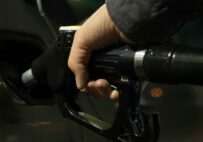Why It’s Dangerous to Pump Gas with the Car Running

You’ve seen the signs at gas stations warning you to turn off your engine before pumping gas. If you’re like most people, you’ve probably been tempted to ignore the sign—especially on a particularly hot or cold day. If you have ever rebelled against this directive and pumped gas with the engine on, it’s very likely that nothing happened, but does that mean it’s safe to pump gas without turning off the vehicle?
The short answer is no, and here’s why: Though rare, pumping gas with the engine on can lead to a fire. In order for this to happen, it has to be a perfect storm of bad luck, and that’s why instances of such fires are rare.
You might be wondering why it’s even worth having such a rule if the chance of a problem is so small. The reason is that the results of such a fire can be catastrophic, and it’s not difficult to understand why. You’re at a gas station surrounded by fumes, spilled gas on the ground, and the actual pumps…not to mention other cars nearby. The worst-case scenario would be devastating.
Couple that with the fact these potentially tragic consequences are preventable, and it’s easy to see why gas station owners do not permit customers to pump gas with the engine on—and why some municipalities have even made it a crime to do so.
Why It’s Dangerous to Pump Gas with the Engine On
So now you know it’s potentially dangerous to fuel a running car, but why? What exactly makes this activity a problem? The issue isn’t the running car itself, but rather it’s the conditions that can be created. When you fuel a car with the engine on, it increases the chances of gas vapors coming in contact with heat or electricity. When that happens, ignition can result.
As a safety measure, gas pumps have an automatic stop feature, but there is a chance that the mechanism will fail, causing the tank to overflow and spill gas onto the ground. If that happens, it’s more likely to ignite if the car is running.
Yes, it’s rare. Your car isn’t going to burst into flames simply because you pump gas with the engine running, but when you consider the possible consequences, it’s best to take the simple precaution of shutting off the engine.
Reentering Your Car While Gas is Pumping Also Increases the Chance of Fire
Another cause of fires at gas pumps is static electricity. Anytime you get ready to pump gas, you should discharge any static electricity by touching something before reaching for the gas pump. If you don’t, once you remove the nozzle, there is a chance the static electricity will discharge and cause a flash fire.
So why not reenter your car while the fuel is pumping?
When you reenter your car, you pick up more static electricity, so when you reach to remove the nozzle from your car, a flash fire can result.
A quick internet search leads to videos of gas station fires. Those videos make it clear why being careful—even what some may call overly cautious—is always smart when fueling up.










